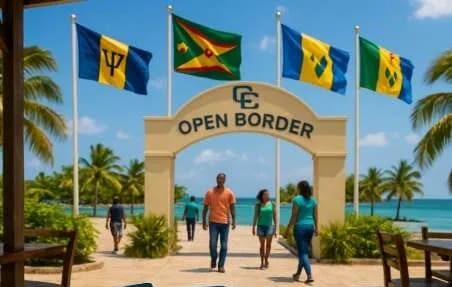Saint Lucia’s economic and societal development could be significantly accelerated by embracing freedom of movement, a policy that not only allows individuals to relocate but also to contribute meaningfully to the local economy. These individuals would pay taxes, contribute to national insurance, participate in the local economy through shopping and dining, fill labor gaps, and bring valuable educational and vocational expertise. However, freedom of movement is a reciprocal arrangement; Saint Lucians would also gain the right to move freely, improving their quality of life abroad while stimulating economic activity and enriching the social fabric of host countries.
Under CARICOM law, Article 7 prohibits discrimination based on nationality, and Article 8 bars any member state from receiving more favorable treatment than another. The Caribbean Court of Justice (CCJ) ruling in Maurice Tomlinson v. Trinidad and Tobago and Belize further clarifies that domestic legislation conflicting with regional integration law does not constitute a breach unless the state’s practices are incompatible. This means Saint Lucia’s actions at ports of entry and within the country must align with treaty obligations.
Article 46, which grants the right to seek employment, could help address the skills gap that public officials have long lamented. However, it could also increase competition for jobs currently held by Saint Lucians. To manage this, a comprehensive dialogue is needed on how to manage competition for scarce jobs while creating pathways for upskilling, cross-migration, and employment in emerging sectors. A radical expansion of tertiary education and skills training is essential to ensure Saint Lucians remain competitive in both regional and global markets.
Policy guardrails must also be considered. Local content policies in Trinidad and Tobago and Guyana raise questions about non-discrimination and most-favored nation treatment. Differentiation must be based on qualifications, expertise, and experience rather than nationality. Upskilling the local population is the best defense against perceived intrusion.
Logistical and transportation issues must be addressed to make air and sea travel across the region more affordable, accessible, reliable, and user-friendly. This would unlock the full benefits of freedom of movement. Additionally, the Revised Treaty of Chaguaramas (RTC) anticipates a future where passports are no longer the sole means of verifying identity within the Caribbean community. Other forms of identification, such as synchronized driver’s licenses, should also be considered.
Addressing myths and misconceptions is crucial. Data from the OECS shows that even with full freedom of movement, migration remains moderate and manageable. People tend to move where skill gaps exist, not indiscriminately. Job security and public services remain intact, and managed migration will continue to exclude those who pose genuine threats.
Caribbean history is a history of migration, and the richness of Saint Lucian experience has long been shaped by the intermingling of skills, talents, and perspectives from across the region. Fear-mongering around this policy is unwarranted. Saint Lucia stands to gain from the infusion of new skillsets, economic, and social capital, and educational and vocational expertise, all of which can strengthen both the country and the wider Caribbean. However, there remains an urgent need to root this vision in the minds, hearts, and souls of the people through consultation, education, and meaningful engagement.
